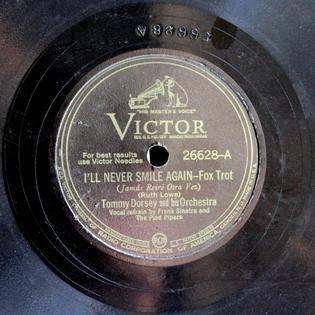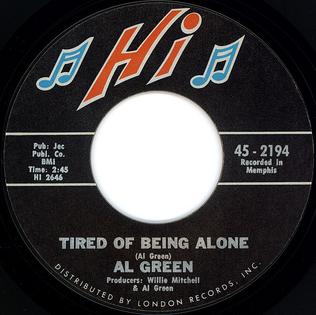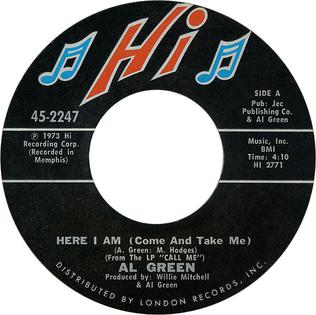Related Research Articles

Lee Ann Womack Liddell is an American country music singer. Her 2000 single, "I Hope You Dance" was a major crossover music hit, reaching No. 1 on the Billboard Country Chart and the Top 15 of the Billboard Hot 100, becoming her signature song.

"Let's Stay Together" is a song by American singer Al Green from his 1972 album of the same name. It was produced and recorded by Willie Mitchell, and mixed by Mitchell and Terry Manning. Released as a single in 1971, "Let's Stay Together" reached number 1 on the Billboard Hot 100, and remained on the chart for 16 weeks and also topped Billboard's R&B chart for nine weeks. Billboard ranked it as the number 11 song of 1972.

"I Can't Get Next to You" is a 1969 No. 1 single recorded by the Temptations and written by Norman Whitfield and Barrett Strong for the Gordy (Motown) label. The song was a No. 1 single on the Billboard Top Pop Singles chart for two weeks in 1969, from October 18 to October 25, replacing "Sugar, Sugar" by the Archies and replaced by "Suspicious Minds" by Elvis Presley. The single was also a No. 1 hit on the Billboard Top R&B Singles for five weeks, from October 4 to November 1, replacing "Oh, What a Night" by the Dells, and replaced by another Motown song, "Baby I'm For Real" by the Originals.

"You're All I Need to Get By" is a song recorded by the American R&B/soul duo Marvin Gaye and Tammi Terrell and released on Motown Records' Tamla label in 1968. It was the basis for the 1995 single "I'll Be There for You/You're All I Need to Get By" from Method Man and Mary J. Blige.

"To Each His Own" is a popular song with music written by Jay Livingston and lyrics by Ray Evans. It is the title song of the movie of the same name and was published in 1946 by Paramount Music. The duo were assigned to write this song after film composer Victor Young turned it down.
Livin' Joy are an Italian and American Eurodance group who released various successful hits during the mid-1990s, including "Dreamer", "Don't Stop Movin'", "Follow the Rules" and “Where Can I Find Love”. The group consists of American singer Tameko Star, and Italian brothers Paolo and Gianni Visnadi. Janice Robinson was previously a member.

Mint Condition is an American R&B band from Minneapolis, Minnesota. The band is focused on diverse genres such as jazz, hip hop, funk and dance. Mint Condition has also been nominated for one Grammy and 3 Soul Train Awards. The group is credited with being one of the last major funk bands to chart before hip hop and new jack swing dominated black music in the 1990s.

"I'm Livin' in Shame" is a 1969 song released for Diana Ross & the Supremes on the Motown label. The sequel to the Supremes' number-one hit, "Love Child," the song peaked in the top ten on the US Billboard Hot 100 pop chart at #10 and the top 20 in the UK at #14 in April and May 1969.
Case Woodard, known mononymously as Case, is an American singer, songwriter, record producer and actor. He is best known for the 1990s hits "Touch Me, Tease Me", "Happily Ever After" and "The Best Man I Can Be", as well as the early 2000s hits "Missing You" and "Livin' It Up" with Ja Rule. The latter two earned him two Grammy Award nominations.

"Livin' on a Prayer" is a song by the American rock band Bon Jovi, and is the band's second chart-topping single from their third album Slippery When Wet. Written by Jon Bon Jovi, Richie Sambora and Desmond Child, the single, released in late 1986, was well received at both rock and pop radio and its music video was given heavy rotation at MTV, giving the band their first No. 1 on the Billboard Mainstream Rock chart and their second consecutive No. 1 Billboard Hot 100 hit.

The discography of American singer Diana Ross, the former lead singer of the Supremes, consists of 25 studio albums and 116 singles. Throughout her career, Ross has sold over 100 million records worldwide. Billboard ranked her as the 47th Greatest Artist of all time and the 11th Greatest Hot 100 Female Artist of all time. In 1993, Guinness World Records crowned Ross as the "most successful female artist in music history". Her 11th studio album "Diana" remains the best-selling album of her career, selling more than 10 million copies around the world.

"I'll Take You There" is a song written by Al Bell, and originally performed by soul/gospel family band the Staple Singers. The Staple Singers version, produced by Bell, was released on Stax Records in February 1972, and spent a total of 15 weeks on the charts and reached #1 on the Billboard Hot 100. It is ranked as the 19th biggest American hit of 1972.

"I'll Never Smile Again" is a 1939 song written by Ruth Lowe. It has been recorded by many other artists since, becoming a standard.

"Tired of Being Alone" is a soul song written by American singer Al Green. It reached number 11 on the Billboard Hot 100 and number seven on the Soul Singles Chart in 1971. Billboard ranked it as the number-12 song for 1971.
"Little Darling (I Need You)" is a 1966 single written and produced by Holland-Dozier-Holland and recorded and released by Marvin Gaye on the Tamla label.
If You Ain't Lovin' " is a song written by Tommy Collins and originally recorded by country music artist Faron Young.
"Full of Fire" is a 1975 song written by Al Green, Mabon Hodges, Willie Mitchell and recorded by Al Green. The single has a more up-tempo feel than his previous releases and was Green's last of six number ones on the R&B chart. "Full of Fire" also reached number twenty-eight on the Billboard Hot 100 singles chart.
"L-O-V-E (Love)" is a 1975 Soul single by Al Green. The single was produced by Willie Mitchell, who also co-wrote the song along with Al Green and Mabon Hodges. The single was from the LP Al Green Is Love and continued a string of number one R&B hits throughout the 1970s.
"Funny How Time Slips Away" is a song written by Willie Nelson and first recorded by country singer Billy Walker. Walker's version was issued as a single by Columbia Records in June 1961 and peaked at number 23 on the Hot C&W Sides chart. The song has been featured in several live action films and television shows, such as in the first episode of the second season of AMC’s Better Call Saul and in the 2020 Netflix drama The Devil All the Time.

"Here I Am (Come and Take Me)" is a 1973 song by Al Green, the second single released from his album Call Me. The song reached number 10 on the Billboard Hot 100 and number two on the Hot Soul Singles chart. It was certified as a gold record by the Recording Industry Association of America.
References
- ↑ Whitburn, Joel (2004). Top R&B/Hip-Hop Singles: 1942-2004. Record Research. p. 230.